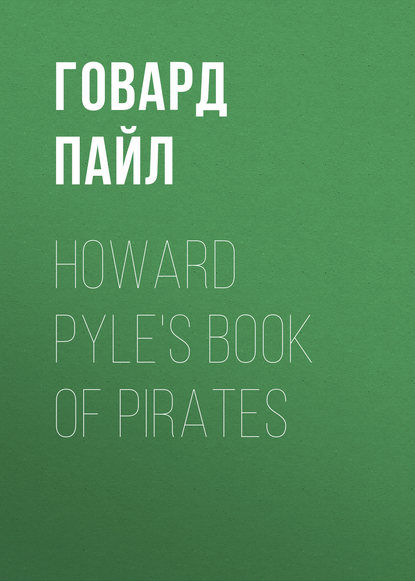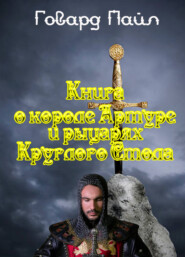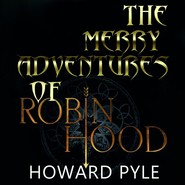По всем вопросам обращайтесь на: info@litportal.ru
(©) 2003-2024.
✖
Howard Pyle's Book of Pirates
Настройки чтения
Размер шрифта
Высота строк
Поля
His first act was to climb the nearest sand hill and to gaze out toward the offing where the pirate ship had been the day before.
It was no longer there.
Soon afterward Matt Abrahamson came out of the cabin and he called to Tom to go get a bite to eat, for it was time for them to be away fishing.
All that morning the recollection of the night before hung over Tom Chist like a great cloud of boding trouble. It filled the confined area of the little boat and spread over the entire wide spaces of sky and sea that surrounded them. Not for a moment was it lifted. Even when he was hauling in his wet and dripping line with a struggling fish at the end of it a recurrent memory of what he had seen would suddenly come upon him, and he would groan in spirit at the recollection. He looked at Matt Abrahamson's leathery face, at his lantern jaws cavernously and stolidly chewing at a tobacco leaf, and it seemed monstrous to him that the old man should be so unconscious of the black cloud that wrapped them all about.
When the boat reached the shore again he leaped scrambling to the beach, and as soon as his dinner was eaten he hurried away to find the Dominie Jones.
He ran all the way from Abrahamson's hut to the parson's house, hardly stopping once, and when he knocked at the door he was panting and sobbing for breath.
The good man was sitting on the back-kitchen doorstep smoking his long pipe of tobacco out into the sunlight, while his wife within was rattling about among the pans and dishes in preparation of their supper, of which a strong, porky smell already filled the air.
Then Tom Chist told his story, panting, hurrying, tumbling one word over another in his haste, and Parson Jones listened, breaking every now and then into an ejaculation of wonder. The light in his pipe went out and the bowl turned cold.
"And I don't see why they should have killed the poor black man," said Tom, as he finished his narrative.
"Why, that is very easy enough to understand," said the good reverend man. "'Twas a treasure box they buried!"
In his agitation Mr. Jones had risen from his seat and was now stumping up and down, puffing at his empty tobacco pipe as though it were still alight.
"A treasure box!" cried out Tom.
"Aye, a treasure box! And that was why they killed the poor black man. He was the only one, d'ye see, besides they two who knew the place where 'twas hid, and now that they've killed him out of the way, there's nobody but themselves knows. The villains – Tut, tut, look at that now!" In his excitement the dominie had snapped the stem of his tobacco pipe in two.
"Why, then," said Tom, "if that is so, 'tis indeed a wicked, bloody treasure, and fit to bring a curse upon anybody who finds it!"
"'Tis more like to bring a curse upon the soul who buried it," said Parson Jones, "and it may be a blessing to him who finds it. But tell me, Tom, do you think you could find the place again where 'twas hid?"
"I can't tell that," said Tom, "'twas all in among the sand humps, d'ye see, and it was at night into the bargain. Maybe we could find the marks of their feet in the sand," he added.
"'Tis not likely," said the reverend gentleman, "for the storm last night would have washed all that away."
"I could find the place," said Tom, "where the boat was drawn up on the beach."
"Why, then, that's something to start from, Tom," said his friend. "If we can find that, then maybe we can find whither they went from there."
"If I was certain it was a treasure box," cried out Tom Chist, "I would rake over every foot of sand betwixt here and Henlopen to find it."
"'Twould be like hunting for a pin in a haystack," said the Rev. Hilary Jones.
As Tom walked away home, it seemed as though a ton's weight of gloom had been rolled away from his soul. The next day he and Parson Jones were to go treasure-hunting together; it seemed to Tom as though he could hardly wait for the time to come.
V
The next afternoon Parson Jones and Tom Chist started off together upon the expedition that made Tom's fortune forever. Tom carried a spade over his shoulder and the reverend gentleman walked along beside him with his cane.
As they jogged along up the beach they talked together about the only thing they could talk about – the treasure box. "And how big did you say 'twas?" quoth the good gentleman.
"About so long," said Tom Chist, measuring off upon the spade, "and about so wide, and this deep."
"And what if it should be full of money, Tom?" said the reverend gentleman, swinging his cane around and around in wide circles in the excitement of the thought, as he strode along briskly. "Suppose it should be full of money, what then?"
"By Moses!" said Tom Chist, hurrying to keep up with his friend, "I'd buy a ship for myself, I would, and I'd trade to Injy and to Chiny to my own boot, I would. Suppose the chist was all full of money, sir, and suppose we should find it; would there be enough in it, d'ye suppose, to buy a ship?"
He poured it into the dish that the good man made of his hands, and the parson made a motion as though to empty it into his pocket. Then he stopped, as though a sudden doubt had occurred to him. "I don't know that 'tis fit for me to take this pirate money, after all," he said.
"But you are welcome to it," said Tom.
Still the parson hesitated. "Nay," he burst out, "I'll not take it; 'tis blood money." And as he spoke he chucked the whole double handful into the now empty chest, then arose and dusted the sand from his breeches. Then, with a great deal of bustling energy, he helped to tie the bags again and put them all back into the chest.
They reburied the chest in the place whence they had taken it, and then the parson folded the precious paper of directions, placed it carefully in his wallet, and his wallet in his pocket. "Tom," he said, for the twentieth time, "your fortune has been made this day."
And Tom Chist, as he rattled in his breeches pocket the half dozen doubloons he had kept out of his treasure, felt that what his friend had said was true.
As the two went back homeward across the level space of sand Tom Chist suddenly stopped stock-still and stood looking about him. "'Twas just here," he said, digging his heel down into the sand, "that they killed the poor black man."
"And here he lies buried for all time," said Parson Jones; and as he spoke he dug his cane down into the sand. Tom Chist shuddered. He would not have been surprised if the ferrule of the cane had struck something soft beneath that level surface. But it did not, nor was any sign of that tragedy ever seen again. For, whether the pirates had carried away what they had done and buried it elsewhere, or whether the storm in blowing the sand had completely leveled off and hidden all sign of that tragedy where it was enacted, certain it is that it never came to sight again – at least so far as Tom Chist and the Rev. Hilary Jones ever knew.
VII
This is the story of the treasure box. All that remains now is to conclude the story of Tom Chist, and to tell of what came of him in the end.
He did not go back again to live with old Matt Abrahamson. Parson Jones had now taken charge of him and his fortunes, and Tom did not have to go back to the fisherman's hut.
Old Abrahamson talked a great deal about it, and would come in his cups and harangue good Parson Jones, making a vast protestation of what he would do to Tom – if he ever caught him – for running away. But Tom on all these occasions kept carefully out of his way, and nothing came of the old man's threatenings.
Tom used to go over to see his foster mother now and then, but always when the old man was from home. And Molly Abrahamson used to warn him to keep out of her father's way. "He's in as vile a humor as ever I see, Tom," she said; "he sits sulking all day long, and 'tis my belief he'd kill ye if he caught ye."
Of course Tom said nothing, even to her, about the treasure, and he and the reverend gentleman kept the knowledge thereof to themselves. About three weeks later Parson Jones managed to get him shipped aboard of a vessel bound for New York town, and a few days later Tom Chist landed at that place. He had never been in such a town before, and he could not sufficiently wonder and marvel at the number of brick houses, at the multitude of people coming and going along the fine, hard, earthen sidewalk, at the shops and the stores where goods hung in the windows, and, most of all, the fortifications and the battery at the point, at the rows of threatening cannon, and at the scarlet-coated sentries pacing up and down the ramparts. All this was very wonderful, and so were the clustered boats riding at anchor in the harbor. It was like a new world, so different was it from the sand hills and the sedgy levels of Henlopen.
Tom Chist took up his lodgings at a coffee house near to the town hall, and thence he sent by the postboy a letter written by Parson Jones to Master Chillingsworth. In a little while the boy returned with a message, asking Tom to come up to Mr. Chillingsworth's house that afternoon at two o'clock.
Tom went thither with a great deal of trepidation, and his heart fell away altogether when he found it a fine, grand brick house, three stories high, and with wrought-iron letters across the front.
The counting house was in the same building; but Tom, because of Mr. Jones's letter, was conducted directly into the parlor, where the great rich man was awaiting his coming. He was sitting in a leather-covered armchair, smoking a pipe of tobacco, and with a bottle of fine old Madeira close to his elbow.
Tom had not had a chance to buy a new suit of clothes yet, and so he cut no very fine figure in the rough dress he had brought with him from Henlopen. Nor did Mr. Chillingsworth seem to think very highly of his appearance, for he sat looking sideways at Tom as he smoked.
"Well, my lad," he said, "and what is this great thing you have to tell me that is so mightily wonderful? I got what's-his-name – Mr. Jones's – letter, and now I am ready to hear what you have to say."
But if he thought but little of his visitor's appearance at first, he soon changed his sentiments toward him, for Tom had not spoken twenty words when Mr. Chillingsworth's whole aspect changed. He straightened himself up in his seat, laid aside his pipe, pushed away his glass of Madeira, and bade Tom take a chair.
He listened without a word as Tom Chist told of the buried treasure, of how he had seen the poor negro murdered, and of how he and Parson Jones had recovered the chest again. Only once did Mr. Chillingsworth interrupt the narrative. "And to think," he cried, "that the villain this very day walks about New York town as though he were an honest man, ruffling it with the best of us! But if we can only get hold of these log books you speak of. Go on; tell me more of this."
When Tom Chist's narrative was ended, Mr. Chillingsworth's bearing was as different as daylight is from dark. He asked a thousand questions, all in the most polite and gracious tone imaginable, and not only urged a glass of his fine old Madeira upon Tom, but asked him to stay to supper. There was nobody to be there, he said, but his wife and daughter.
Tom, all in a panic at the very thought of the two ladies, sturdily refused to stay even for the dish of tea Mr. Chillingsworth offered him.












